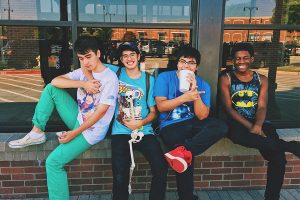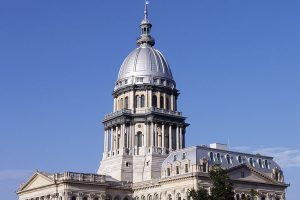HB3821 Passes, Creating a Task Force to Examine Racial Disproportionality in the Child Welfare System
Publisher: ICOY Staff
CHICAGO – Illinois parents and advocates pushing for critical changes to Illinois’ foster system are celebrating the passage of HB3821, which will create a Racial Disproportionality in Child Welfare Task Force. The task force will examine the foster system’s disproportionate impact on Black families and communities, what is bringing families into the system, what is keeping them involved, and what long-term impacts and harms are tied to system involvement. The task force will then explore both current and alternative policies and practices to improve outcomes for Illinois families.
Of over 21,000 Illinois children in foster placements, Black children and youth are disproportionately represented at approximately three times their percentage of the statewide child population and are overrepresented at multiple critical decision points throughout system involvement. System involvement often begins with a call to the child abuse hotline by a mandated reporter that leads to an investigation by the Illinois Department of Children & Family Services (DCFS). It is estimated that 53% of Black children nationwide will experience an investigation of abuse or neglect by age 18. These investigations may lead to court involvement, and throughout these processes children may be removed from their families for varying lengths of time. Many studies have shown that these removals, even if for short periods, are traumatic for both children and parents. Once involved with the foster system, youth are then at higher risk of experiencing juvenile and adult criminal legal system involvement. Black families and communities are thus disproportionately impacted and harmed by multiple systems.
“The passage of HB3821 marks an important milestone in the fight to keep families together, supported, and thriving,” said Tanya Gassenheimer, Community Justice Staff Attorney at the Shriver Center on Poverty Law. “We hope and expect that the task force, driven by input from people directly impacted by the foster system, will provide a roadmap for strengthening supports and decreasing the harm to Illinois families, particularly Black families and families with low incomes. We also hope that the task force leads to greater transparency and accountability for everyone working in, with, or in relation to the foster system.”
Speaking from her own experience with this system, parent leader and advocate Elena Thompson believes “Illinois needs this Task Force, because it will help tremendously in reducing the racism, biases, and the harm caused by separating Black families. Criminalizing the efforts of parents, especially Black mothers, and forcibly removing their children cannot continue to be an acceptable form of intervention.”
Members appointed to the Racial Disproportionality in Child Welfare Task Force will include parents and foster alumni with the expertise of lived experience in this system, legislators, state agencies, a court administrator, service providers, advocates, and academic researchers. As co-chairs of the task force, the Shriver Center and Illinois Collaboration on Youth (ICOY) will work with members over a year-long period beginning in the fall of 2021 to develop and issue policy recommendations focused on preventing system entry, increasing family preservation and reunification, and eliminating racial disproportionality in system involvement and impact. Task force responsibilities also will include reviewing DCFS’ progress on implementing the Family First Services Prevention Act, a federal law aimed at preventative services; examining processes, policies, and data collection methods for families involved simultaneously in the foster system and juvenile and/or criminal legal systems; and exploring policies and protocols that honor language, culture, and heritage in identity formation and familial relationships.
“Family separation through the child welfare system inflicts lasting intergenerational trauma, and that trauma is disproportionately visited on Black families,” said Andrea Durbin, ICOY’s Chief Executive Officer. “Forcible family separation has its roots in slavery and that toxic legacy reverberates today. This Task Force can shine a light on a system that punishes parents who may struggle to care for their children, and make recommendations for reforms that prioritize child and family wellbeing.”
HB3821 was championed by Illinois legislative leaders Representative Sonya Harper and Senator Mattie Hunter. The Shriver Center and ICOY recognize and thank them for their zealous advocacy. It is expected that Governor Pritzker will soon sign the bill into law.
The Shriver Center is fighting for a future where families, particularly Black mothers and children, are living lives filled with love and joy instead of fear and pain as they fill child protection court courtrooms, fighting to either stay together or reunify their families; where Black people are not fighting for their freedom in the criminal legal system or resisting being surveilled by agencies and systems that claim to support them; and where the foster-system-to-prison pipeline no longer exists.
ICOY has also championed legislation to address racial disparities in child welfare, including systemic underfunding that perpetuates these disparities. These bills include a requirement that mandated reporters receive training on implicit bias, and that DCFS produce an annual analysis of racial disparities in the system. ICOY advocates for a transformed approach to child and family wellbeing that keeps families intact and addresses root causes of abuse and neglect through programs like cash assistance, employment, housing, and childcare, as well as services that address mental illness, trauma, addiction, and domestic violence.
The Shriver Center on Poverty Law fights for economic and racial justice. Over our 50-year history, we have secured hundreds of victories with and for people living in poverty in Illinois and across the country. Today, we litigate, shape policy, and train and convene multi-state networks of lawyers, community leaders, and activists nationwide. Together, we are building a future where all people have equal dignity, respect, and power under the law. Join the fight at povertylaw.org.
Illinois Collaboration on Youth (ICOY) represents more than 100 community-based providers serving young people and their families; our mission is to promote the safety, health, and success of Illinois’ children, youth, and families by acting as a collective voice for policy and practice, and by connecting and strengthening the organizations that serve them.






